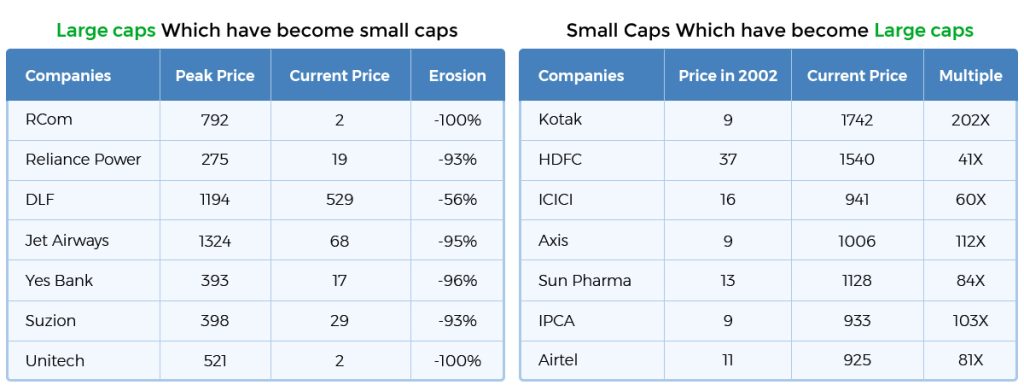This article summarizes the investment strategy of Siddhartha Bhaiya, the Managing Director and CIO of Aequitas. He is a qualified CA and the driving force behind Aequitas, with more than 20 years of experience in Equity Research and Equity Fund Management. He has been instrumental in taking Aequitas from a start-up to one with a consistently strong performance track record.
He believes in generating outsized returns by investing in small-cap undiscovered companies. He is a specialist in bottom-up stock selection and identifying multibaggers. Multibagger stocks are equity shares of a company which are capable of creating returns several times higher than their associated cost of acquisition. His approach has helped generate a 34% CAGR since inception for Aequitas’ investors. This means that INR 1 million invested with Aequitas in February 2013 was worth INR 25.8 million as on 29th February 2024.
Without envy and in the spirit of learning, we must ask ourselves how someone can achieve and maintain such a stellar record. Such returns are standard deviations above the norm, and while luck may play a role in achieving this success, a different approach based on remarkable skill certainly seems to be the key ingredient. Going through Siddhartha Bhaiya’s videos, presentations, and other relevant material, we have distilled his key lessons for investors. While the words may not exactly be his own, these are our key takeaways.
The article is divided in two parts. Part One focuses on not losing money and the value of patience in the market. Part Two focuses on Siddhartha Bhaiya’s investment philosophy, his opinions on skill and luck, and the importance of healthy habits.
Let’s dive into Part Two.
Lesson #6: Growth, Contrarianism, and Value are the Key Ingredients for a Multibagger
- Growth: The market always rewards growth with higher multiples as faster-growing companies can generate higher cash flows over time than slow-growing ones.
- Contrarianism: Buying well-covered popular stocks will not lead to multibagger returns. Contrarianism does not mean an investor should buy stocks the market dislikes, but rather looking for opportunities where others are not.
- Valuation: Paying less than what a company is worth is essential to make large asymmetrical gains. While companies cannot sustain high revenue growth rates for extended periods, a low entry multiple allows for rerating and therefore excess returns.
Lesson #7: Be Market Capitalization Agnostic
Heuristically, people tend to believe that large caps are safe and small caps are mostly risky to own. Making decisions based on such heuristics limits an investor’s ability to generate returns. Current large caps were small caps a few decades ago, while some large caps a decade ago are currently small caps or entirely worthless. Conversely, some small caps today could be large caps tomorrow or entirely worthless. A stock picker must understand business dynamics and not rely on mental shortcuts to justify portfolio allocation.
Source: Aequitas PMS Presentation March 2024
Lesson #8: Skill & Luck
Investing is a blend of skill and luck, and distinguishing between the two is crucial. In a bull market, even poor decisions can yield great returns, but it's vital to recognize these decisions as poor. When the market sentiment shifts, turning a bull market into a bear market, good luck can turn sour, exacerbated by poor decisions. Similarly, during a bear market, even sound decisions may result in unfavourable returns, yet it remains essential to discern whether these low or negative returns stem from poor decisions or adverse fortune. As the market transitions from bear to bull, astute decisions reap the greatest benefits.
One should evaluate a company not solely based on delivered returns but on the quality of its underlying business. The future is inherently uncertain, and decisions must be made based on present-day information. For instance, one might invest in a high-quality business in January 2020 only to face the Covid-19 pandemic crash, or in a low-quality business in 2004 and ride the bull run preceding the Global Financial Crisis. Focusing on making sound decisions, rather than fixating on their outcomes, is integral to becoming a skilled investor.
Lesson #9: Lead a Healthy Lifestyle
Investing is an exceptionally challenging profession, primarily because outcomes aren't directly correlated with the quality of decision-making. External factors can significantly influence the success or failure of investment decisions. Investing entails making bets amidst uncertainty about repayment, return on capital, and the time required. Consequently, being an investor can be immensely stressful, regardless of past performance. Therefore, it's imperative for investors to adopt a healthy lifestyle. Practicing good eating, drinking, and fitness habits is vital for success. Poor health can severely constrain both personal and professional life. Maintaining physical and mental well-being is crucial for effective investing. While the adage says "health is wealth," it can also be said that good health is the foundation of wealth.
Conclusion
The first two key lessons have been covered in Part One.
The third key lesson revolves around his approach towards making money. His philosophy focuses on growth, contrarianism and value as the essential ingredients for a multibagger return. Increasing profits is important for the company to increase its intrinsic value, and buying such companies at low prices increases one’s ability to make higher returns. This is achievable through a contrarian approach, by looking for opportunities where no one else is. The fourth lesson is one of skill and luck. Investing is a combination of skill and luck. Good investments can be hurt by unexpected events, and bad investments can give good returns due to good market conditions. An investor should focus on strong processes to select good stocks, rather than using returns as the sole benchmark for quality of decision making. Finally, Siddhartha Bhaiya emphasizes on the importance of leading a healthy lifestyle. Being an investor can be stressful, and the stress can compound when one invests for other people. Practicing good eating, drinking, and fitness habits is vital for success as these are crucial to prevent stress from compromising your mental health.
Explore more insights by starting from the beginning. Click here to read Part 1.
Already have an account? Log in
Want complete access
to this story?
Register Now For Free!
Also get more expert insights, QVPT ratings of 3500+ stocks, Stocks
Screener and much more on Registering.
































Comment Your Thoughts: